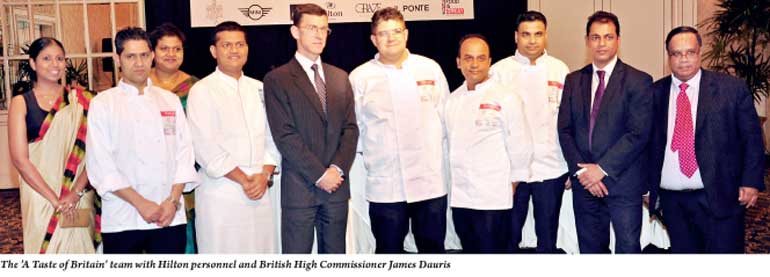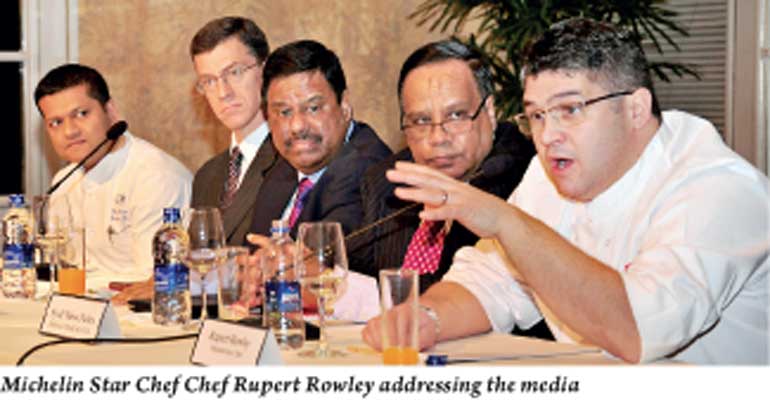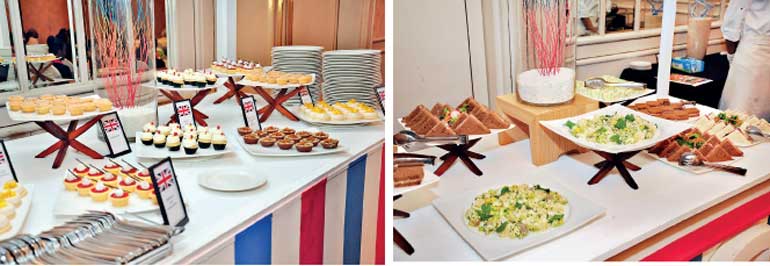Sunday Feb 15, 2026
Sunday Feb 15, 2026
Saturday, 27 January 2018 00:00 - - {{hitsCtrl.values.hits}}

By Madushka Balasuriya
It may come as a surprise to many of you, as it did to this writer, that Chicken Tikka Masala is not a dish that originated in the Indian Subcontinent. Rather, as a cursory Google search will reveal, while Chicken Tikka is a staple Indian dish, the masala sauce or gravy was added to “satisfy the desire of British people to have their meat served in gravy”. This in a nutshell highlights Britain’s long and detailed love affair with curry, a dish that has for so long been a part of British cuisine it is now in fact considered part of the national diet.
“In the UK curry is a full-blown cuisine in itself. The history of curry, although it started in the Indian Subcontinent, the first Indian curry restaurants opened in London in 1809. So the history goes back more than 200 years. Curry is as much British Food as Strawberry Jam and Crumpets,” explains the Editor of Curry Life magazine Syed Bilal Ahmed.
 Ahmed is also the Director and Organiser of the Taste of Britain Festival that is taking place at the Hilton Colombo from 24-28 January. Addressing the media at the festival launch, Ahmed painted a picture just how important ‘curry’ is to British cuisine.
Ahmed is also the Director and Organiser of the Taste of Britain Festival that is taking place at the Hilton Colombo from 24-28 January. Addressing the media at the festival launch, Ahmed painted a picture just how important ‘curry’ is to British cuisine.
“Curry is a £4.5 billion industry in the UK, and it’s still growing. There are more than 12,000 curry restaurants across Britain. And all the curry restaurants across Europe follow the UK model of curry. Although most of the dishes were created in this region, the chefs in Britain are very creative like artists. So they have included so many different ingredients, and they experiment, so the food has evolved. Balti for example was created in Birmingham.”
Balti, a curry cooked in vegetable oil as opposed to ghee and served in a curry served in a thin, pressed-steel wok called a ‘balti bowl,’ was brought to Birmingham in the 1970s by the city’s large Pakistani and Kashmiri population. The dish is so famous now, that Birmingham is commonly known as the Balti Triangle with over 100 restaurants serving Balti dishes in the area.
While Balti has a history spanning some five decades, Britain’s relationship with curry goes back over two centuries – a fact not lost on the British High Commissioner to Sri Lanka James Dauris, who also addressed the gathered media.
“Curry today in the UK is eaten much more widely than it used to be and is a much more common dish. But history goes back a long way, probably 250 years, to the time in medieval England that wasn’t the most exciting of occasions. There was very little spice, and it was sort of meat and green vegetables and more meat and green vegetables.
“Then along came the East India Company in the 17th century and brought spices, specifically brought curry to England for the first time. And curry powder started to become available in the UK in the 1700s. And curry recipes were published, and in 1784 we had the first curry advert in an English newspaper, ‘Curry is an exceedingly pleasant and healthy food, it renders the stomach active in digestion, the blood naturally free in circulation, and the mind vigorous.’ Now that is quite a claim for curry and you can understand why it quickly became so popular.”
Taste of Britain
As such the Taste of Britain festival calls attention to not just ‘traditional’ British food fare such as Fish & Chips, Roast Beef & Yorkshire Pudding, and Bread & Butter Pudding, but also what modern day Britains consider their staple food – curry.
Kicking off the festival was a decadent spread consisting of Onion Bhaji, Honey Glazed Mustard Fish Tikka, Oregano Chicken Tikka, Spiced King Prawns and Tempura Vegetables, Lauki Channa Madras, Naga Fish Balti, Chicken Tikka Masala, and British Lamb Jhalfrezi – all dishes that might have otherwise been considered traditionally Indian, but made with a quintessentially British spin.
“The best thing for me about British food is how international it is. Every day, every week there are new ingredients. The other day we walked into Graze and there was a little spice, I didn’t know what it was. You always find something knew. It’s about trying new things and learning new ways of cooking and, you know, you might do a dish one way on one day and another way the next day. That’s what Britain is great at, we have a foundation in French cuisine but now with the introduction of so many new ingredients the sky’s the limit,” says Chef Rupert Rowley.
Rowley is a Michelin Star Chef, who is down in Sri Lanka with his contingent of British curry chefs Vijay Singh Panwar from London, Abul Monsur from Chatham, Kent and Syeduz Zaman Kamran from Warrington Cheshire. But fret not he will also be serving up some of his favourite dishes over the course of the festival.
While Hilton’s Graze Kitchen will play host to a special pod filled with British curries, the hotel’s Il Ponte Italian restaurant will until 28 January offer up a special à la carte dinner menu (7 p.m.-10:30 p.m.) designed by Chef Rupert himself, which will be made up of several of his favourite British, Italian and French dishes.
Also running till 28 January is Chef Rupert’s authentic British High Tea experience from 3 p.m.-6 p.m. at the LAB lounge (Rs. 3,200 nett for two), while today (27) Chef Rupert will be hosting a special cooking masterclass from 10 a.m.-1 p.m.

